
LESSON STAGES and LESSON LINKS
Any textbook offers training and speech tasks and exercises
Training exercises alone often fail to prepare the learner for communicative tasks.
Fill in the required tense forms
Translate into Russian
Give examples using the words and phrases
Such tasks never prepare learner for communication: ...
Level: advanced
Age: 14-17
Downloads: 11
|
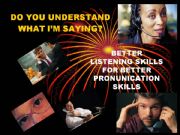
EFL TEACHING BETTER�LISTENING SKILLS �FOR BETTER�PRONUNICATION SKILLS
General features of teaching pronunciation
Teaching pronunciation is important not just because it is necessary to communicate one�s ideas clearly.
Articulation movements accompany the process of using the language not only when a person is speaking but also during listening, reading and writin...
Level: advanced
Age: 18-100
Downloads: 48
|
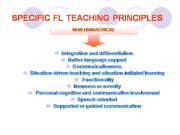
SPECIFIC FL TEACHING PRINCIPLES
Integration and differentiation
Native language support
Communicativeness
Situation-driven teaching and situation-initiated learning
Functionality
Newness or novelty
Personal cognitive and communicative involvement
Speech-oriented
Supported or guided communication
Level: advanced
Age: 14-17
Downloads: 20
|
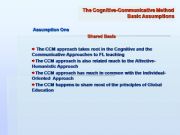
The Cognitive-Communicative Method�Basic Assumptions
Shared Basis
The CCM approach takes root in the Cognitive and the Communicative Approaches to FL teaching
The CCM approach is also related much to the Affective-Humanistic Approach
The CCM approach has much in common with the Individual-Oriented Approach
The CCM happens to share most of the...
Level: advanced
Age: 14-17
Downloads: 16
|
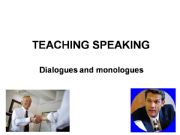
TEACHING SPEAKING Dialogues and monologues
Teaching dialogue means arranging a series of training exercises to master all of its possible components � lexical and grammatical models typical of real-life communication � and to train communicative reactions to what is heard
Modify and repeat
Learn and repeat
Answer together according to the...
Level: advanced
Age: 17-100
Downloads: 40
|
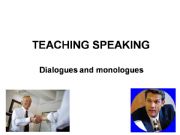
TEACHING SPEAKING Dialogues and monologues
Teaching dialogue is based on psycholinguistic nature of speech generation (production) and speech reception
A speech stimulus requires use of real communicative situations or invention of an imaginative one
Programming an utterance that includes the stage of structural analysis of the situation a...
Level: advanced
Age: 15-100
Downloads: 27
|
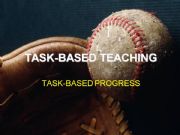
TASK-BASED TEACHING
Approaches to tasks classification
Do they teach to understand language use? - Informational
Do they teach to make effective use of language items? � Operational
Do they motivate the use of language for communication? � Motivational
Do they focus on form? � Non-communicative
Do they focus on...
Level: advanced
Age: 18-100
Downloads: 45
|
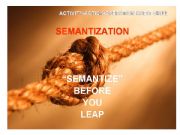
SEMANTIZATION �SEMANTIZE� BEFORE YOU LEAP
SEMANTIZATION
is a step-to-step process
presupposes a whole range of intellectual operations (mental, intellectual, thinking), to be done to establish lexical and grammatical links in the sentence:
breaking the sentence pattern into logical elements
defining grammatical and lexical meanings
re...
Level: advanced
Age: 14-17
Downloads: 13
|

The use of informational technologies at early stages of studying the Japanese language
The use of informational technologies at early stages of studying the Japanese language
Level: advanced
Age: 14-17
Downloads: 1
|

TEACHING �WRITING �IN EFL �CLASSROOM Writing as communication
Types of writing
Writing can be expressive, poetic, informative and persuasive.
Depending on the type of writing, the writer concentrates either on the subject matter of the written piece, or on the reader, or on one�s own feelings and thoughts.
The triangle of the �subject matter�, �writer� ...
Level: advanced
Age: 17-100
Downloads: 48
|